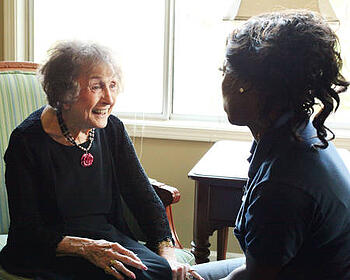 Communication is an essential part of human interactions. Without the ability to exchange information, ask for help, and share our feelings, a number of devastating consequences can ensue.
Communication is an essential part of human interactions. Without the ability to exchange information, ask for help, and share our feelings, a number of devastating consequences can ensue.
For aging adults suffering from age-related speech issues or those who are recovering from stroke, dementia or a head injury, speech therapy offers an extremely useful means to regaining the essential skill of communication.
Why Speech Therapy?
As we get older, our ability to communicate can be compromised in different ways. From strokes and head injuries to cognitive diseases, the implications of speech impairment are significant, and can affect everything from communication to organization to problem-solving.
But speech therapy isn’t just beneficial to people recovering from illness or injury; it is also an effective treatment for older people facing speech issues related to the natural weakening of the vocal cords and larynx muscles.
In short, speech therapy offers the profound ability to help seniors deal with cognition, language and even swallowing problems.
Signs and Symptoms
While communication challenges may manifest in a few different ways, there are some specific things to watch for if you think your aging loved one may need speech therapy. These include difficulty with making requests and/or responding to them; new challenges managing personal matters, such as health care and finances; and the inability to avoid or prevent potentially harmful situations. Older adults struggling with speech difficulties may also be unable to express their emotions and therefore more prone to anger or frustration.
If you notice any of these changes in your aging loved one, a conversation with his/her doctor can help determine whether speech therapy is necessary.
Next Steps
If you determine that speech therapy is the best course, a comprehensive speech therapy assessment can help identity specific issues as well as best treatment methods. From language-based problems to cognitive lapses, speech therapy can teach patients new techniques and compensatory strategies for regaining the ability to communicate.
In other cases, speech therapy rules out voice, language and cognition problems. This allows health care practitioners to look for underlying factors, which can include anything from medication to dehydration.
And remember: consistent communication struggles are not normal and should be promptly dealt with for best outcomes. For many aging adults, speech therapy offers a deeply meaningful opportunity to regain critical communication skills.
Key Takeaways
- While communication challenges may increase with age, speech therapy intervention offers hope.
- Any changes in your loved one’s ability to communicate should be discussed with his/her healthcare practitioner.
- Speech therapy not only offers treatment for language-related issues, but can also help identify underlying medical concerns.

